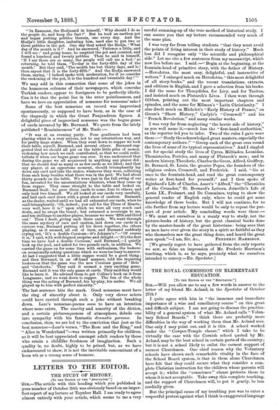LETTERS TO THE EDITOR.
THE STUDY OF HISTORY.
(.To THE EDITOR OF THE "ApEcrAroa."]
'Sin,—The article with this heading which you published in your number of October 20th was obviously based on an imper- -feet report of my lecture at Toynbee Hall. I am ready to agree almost entirely with your article, which seems to me a very careful summing-up of the true method of historical study. I can assure you that my lecture recommended very much of the same plan.
I was very far from telling students "that they must avoid the points of living interest in their study of history." Much less did I recognise only " the scientific and philosophical side." Let me cite a few sentences from my manuscript, which now lies before me. I said :—" Begin at the beginning, at the fountain-head of primitive story, with the father of History, —Herodotus, the most easy, delightful, and instructive of writers." I enlarged much on Herodotus, " this most delightful of all story-books," and the recent translations, extracts, and editions in English, and I gave a selection from his books. I did the same for Thucydides, for Livy, and for Tacitus, and insisted much on Plutarch's Lives. I then went through Gibbon, pointing out the most important chapters and episodes, and the same for Milman's " Latin Christianity." I also dwelt much on Michelet's "Early History of France," on Green's " Short History," Carlyle's " Cromwell " and his French Revolution," and many similar works.
I was very far from neglecting "the heroic side of history," as you well name it,—much less the " first-hand authorities," as the reporter led you to infer. Two of the rules I gave were these :—" Study the acknowledged great masters, especially the contemporary authors :" " Group each of the great eras round the lives of some of its typical representatives." And I singled out for special study the lives of Cyrus, Miltiades, Leonidas, Themistocles, Pericles, and many of Plutarch's men ; and in modern history, Theodoric, Charles the Great, Alfred, Godfrey, St. Bernard, St. Louis, the greater Popes, the founders of the religious orders, Cromwell, and Frederick. I said, " Go at once to the fountain-head, and read the great contemporary writer at first-hand for yourself ;" and I then spoke of Eginhard's Life of Charles, Asser's "Alfred," the "Chronicles of the Crusades," St. Bernard's Letters, Joinville's Life of Louis IX., Froissart, and De Commines, trying to show the general reader of English only, where he could get some knowledge of these books. But I will not continue, for to cite further from my lecture would be only to repeat the pur- port of your article. My concluding words were these :— " We must set ourselves in a manly way to study, not the picture-books of history, but the great classical books done by the master-hands of the great historians : being sure that no men have ever given the story in a spirit so faithful as they who themselves saw the great thing done, and heard the great
[We greatly regret to have gathered from the only reports we saw, so false an impression of Mr. Frederic Harrison's teaching, which is, as he says, precisely what we ourselves intended to convey.—En. Spectator.]


















































 Previous page
Previous page